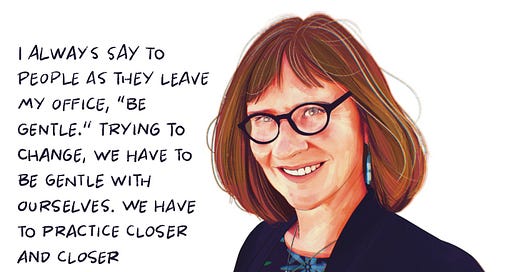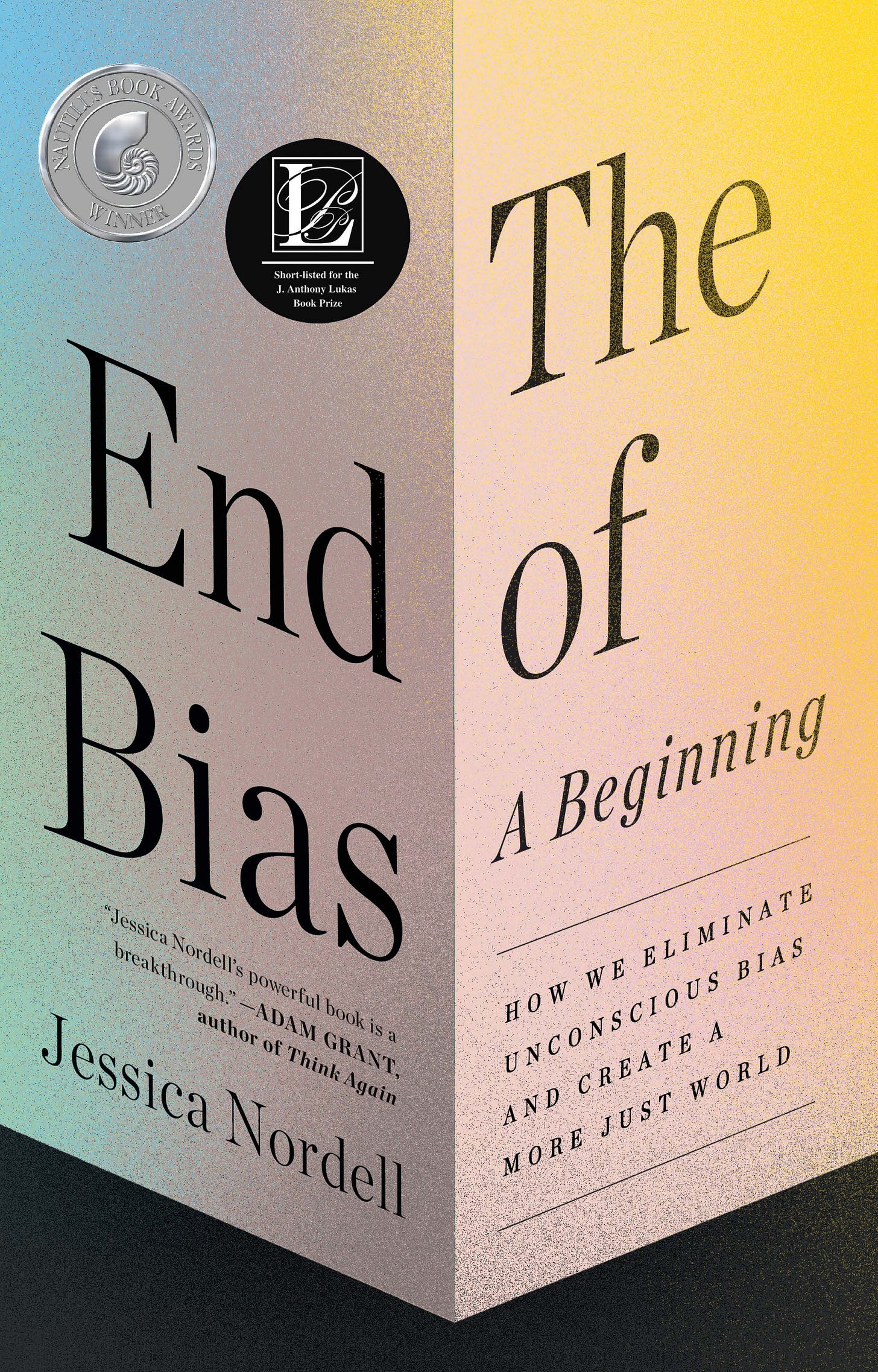Ask For 95% Healing, Maximum
Part 2 with Brenda Hartman on death, life, and getting from B to A
Hello wonderful people! I’m back with therapist, cancer survivor, and Wise Woman of the Upper Midwest Brenda Hartman, one of very few therapists who specializes in end-of-life. Last month, we spoke about the four things to say to our loved ones before we die— “Please forgive me”, “I forgive you”, “I’m going to miss you”, and “I love you.” Today, we continue our conversation about death and make a glorious pivot to… life. What does she make of surviving unsurvivable cancer? What do we do with the wounds of our lives? And why does she recommend you never ask for perfect healing? If you haven’t already, I recommend reading Part 1 first (it’s really good). And thank you to everyone who wrote in last month to share their thoughts and feelings— I love hearing from you! - xo Jess
One of our tasks before someone dies is to say, "I'm going to miss you." I've certainly thought that, but I’m not sure I said it out loud.
"I'm going to miss you" is about the human part, but it also leaves the door open to talk about how we're going to find each other in a different way. That's part of what I talk to people about-- say, with a college student who's got a parent dying. I'm like, "You went to college and you're telling me you never thought about your mom, and she wasn't influencing the decisions you made?"
And they're like, "Only every single day!" <Laughs.>
They say, "I could hear her voice, being pissed off at me because I'm going to this party and I'm not studying." And I say, "Why do you think that's going to change? She's forever in you and with you."
It's true. I'm thinking about the people I've lost. In some ways their presence is even stronger after they die. What's that all about?
Well, because now you're open to that heartfelt, deep, soulful connection. You're not having to filter it with, "She didn't bring the salad. She said she'd bring the salad." <Laughs.>
All the annoyance is gone! I was going to say that someone can't really annoy you after they die, but I guess they could still annoy you after they die.
Possibly yes! <Laughs.> "They never gave me back my chainsaw, dang it." <Laughs.>
But a lot of stuff dissolves away. You're left with what the essence of the person.
And your relationship with them. If it's hurtful, or if it was traumatic-- since that's a continuum, from "you're an irritant to me" to "you're a traumatic experience"-- when the person has died, that offers an opportunity to heal in a different way because the hurts won't keep compounding.
If you do have a hurtful relationship with someone, is it important to try to reconcile with that hurt? Or if not reconcile, at least address it before they die?
I think it really depends on who the participants are.
Hmm.
If you are trying to do that with me, and I'm in a place of being angry, and I'm denying, and I'm focused on what the doctors did wrong, and I'm not wanting to talk about dying? And you're showing me, "Here's how you hurt me"? I can now doubly hurt you, because I can put a hurt on top of a hurt. To talk about those hurts is an act of vulnerability. You are trusting that I'll hold that hurt in a way that is gentle, that didn't happen when it occurred.
When people have someone they want to reconcile with, whether the person is dying or not, I tell them you can say the four things in your heart of hearts. You don't have to say it out loud because-- this is just my belief system-- on a soul level we are communicating.
We've been talking a lot about death. I want to ask you about life. Something that you said once that has stayed with me is that we're all on a healing journey. I'm curious how you came to that truth.
I woke up and there it was. No, I'm just kidding. <Laughs.>
I have had many people ask me over the years-- because it's been over 30 years of doing this work--what's the meaning of life? What's the purpose? What are we trying to do here? Having two near-death experiences and a spontaneous remission changed my perspective.
I see in pictures. One of the pictures that came to mind is developmental-- remember, I was a developmental psychologist. The picture is that people get born, and there's a soul that goes into the physical vessel, and there's a thing called life. Later, the soul leaves the vessel. Again, this is all Brenda stuff. I believe that when the soul goes into the vessel-- the baby-- and right before we die, we're closest to God, or great spirit, the sacred, whatever that is. I liken that to a 100-watt light bulb. Because anyone who's been around a newborn knows they are pure. Amazing. And they do not know how to hold their head up.
Once we make a decision, we often go, "Why did I wait so long?" Because you're finding more of you underneath there, and it feels like coming home.
So the human part's not quite there. But I can feel this glow. Then there's a developmental sequence. Generally speaking, from age zero to five, the 100-watt light bulb gets tamped down to 10 watts. With dark, dark shades, and industrial-strength Velcro holding the shades down. Those shades come from: what year you're born, in what family? Are you a firstborn? Eighth born? What country? Does your family have enough money? Is there alcoholism? Is there violence?
All, all your ACEs [Adverse Childhood Experiences] pull down more and more.*
Exactly. And then you're down to 10 watts.
Everyone in your family.
Everyone in the world. Everybody's got 10 watts. At five, you go to kindergarten and the teacher says, "Grab your carpet square and sit down, I'm gonna read you a book." There's the kid who runs out of the room. There's the kid who starts throwing the carpet squares, the kid sitting in the corner crying. There's the kid sitting on the carpet square waiting for the story.
Now if the teacher had a moment to think about this, that teacher could say, I know everything about these kids' families. This one's gone to story time. This one fights in their family for anything. This one's terrified. The one running out of the room, that's how they get attention.
Those patterns are there by age 5.
Then from five to 15, our job is to function with our family's point of view and learn how to navigate the world. You're trying to figure out, "How do I survive in this? This is what my family, my community has taught me."
At 15, developmentally, two things happen simultaneously. One is that-- I’ll stay in our culture-- you have a best friend and you have spent enough time in your best friend's house that you know that they have a different 10-watt view.
Right.
And abstract reasoning! So now you can compare and contrast. We all have that moment where things kind of pop. Let there be light! And from that moment until we die, how many shades do we want to pull up? I call that healing.
Tell me about the shades.
The shade represents pain. To open it, that Velcro ripping? Pain, physical and or emotional. The angst is in the up-and-down, up-and-down.
The easiest way to think about this is alcoholism: I'm not drinking. I'm drinking. I'm not drinking. I'm drinking. Or making a decision. And once we do it, we often go, "Why did I wait so long?" Because you're finding more of you underneath there, and it feels like coming home.
The other part-- and this is part of the therapeutic process-- is figuring out who's standing in front of that shade. Who's saying, "You don't do that"? You have to neutralize this person. That's my shade. And my healing is underneath that.
What are the elements of that healing? What do people need to do to pursue that path?
That's a big question. There are lots of "therapeutic techniques." It's one thing to understand what's causing me pain. That takes a level of awareness-- I have to recognize the pattern. Research tells us 60% of our day is spent in a pattern. Then I have to really manage my shame around participating in the pattern.
Yes.
"I don't want to eat all of the potato chips, and I finished a bag of potato chips again." Change is very difficult. This is why people keep smoking, or overeating, or doing things that they know aren't good for them. When I'm back to that painful place, I have to be kind and gentle with myself. I always say to people as they leave my office, "Be gentle," because trying to change, we have to be gentle with ourselves. We have to practice closer and closer approximations of what we want to do.
"I'm going to start eating more vegetables." That's a great thing. Don't say, "Every single meal, every single day" because that doesn't work. How about we try it three times a week? Then I can feel good about that when I do. And the days that I don't, I'm not shaming myself. I'm trying to get there.
It sounds like healing-- at least as you're describing it-- is about trying to shift patterns that are keeping us stuck in some kind of lack of health or ease. That pattern could be something concrete, like overeating or drinking too much. Or that pattern could be habits of thinking, like being overly self-critical.
Absolutely. Or your first response is anger. Going back to my lightbulb image, let's say you do personal work and address some of your patterns. You get to 25 Watts. You're doing things differently than when you lived in your parents' house. From those 25 watts, you see other issues. It's important in that moment to go, "Okay, that's not bad! Look at how I have grown!"
Every time you learn something new, you incorporate that, but then it shows you something else. And when we have completed our healing, we leave here. For people facing death, I say, if you're asking to heal, only ask for 95%. So you've still got stuff to work on. Do not go for 100%. <Laughs.>
Only 95%! Noted!
That changes a person's relationship with death, because our culture views death as a failure.
That's why I say life is a healing journey. When I figure something out today, and I go, "Wow, I really screwed that up two years ago because I didn't know," I shame myself. I could say, "From that time to now, look at what I've learned. I've healed my instant reaction, like being so angry or critical or self-critical."
You've had a long arc of working with people. Do you see people suffering now differently than 30 years ago? How is suffering changing?
The pandemic really impacted people. Isolation and anxiety and depression are big pieces that many are still struggling with. This has nothing to do with people facing death. But that's actually what the pandemic was: facing death.
I remember going to see you when I was experiencing a depression many years ago. And I remember you said that depression emerges because it's trying to teach us something. Something's wrong, and emotions are the guides to point you in the right direction. They're here to help you. That seems to me almost opposite from the message, "You're feeling depressed. You have a chemical imbalance."
All our emotions are informative. Anger's informative. It says something's wrong here, and I want to do something. The first thing is to recognize that you have a feeling. And then ask, what do I do with that feeling? If I just act out of if, I'm not allowing it to give me information.
We might need that information for healing! What does healing mean to you?
Becoming more of who you are.
Hm… I wonder what role our wounds play in that process. When we move through life, we acquire a lot of scars and hurts. Do those scars and wounds prevent us from being who we truly are?
Sure. Those are some of the shades. I mean, my story was very simplistic. What it didn't say is when somebody pulls down a shade-- like somebody betrays you and you're an adult-- that certainly that takes the light out. Healing is about reclaiming your light.
Hmm.
"This happened to me, and it's not the totality of who I am." When I think about my cancer experience,
I would never give that experience up--the year primarily in the hospital, the multiple surgeries, all the pain that I was in-- because of what I learned from that and what I gained in being able to sit with people. To really understand and connect with them, because when your scan results show your cancer's growing, that is a terrifying thing.
Something comes in that's really painful. You find opportunities through the healing that only come from this experience.
I call those twisted gifts. Something comes in that's really painful. You do healing work and you find opportunities through the healing that only come from this experience. I don't want to deny the experience, I just don't want to stay stuck in the pain of it, so that I can keep moving.
I love this idea of healing meaning reclaiming your light. It also means working with the thing that happened that took your light away.
Right. Working through it.
And then does that healed part also become part of your authentic self? So healing isn't returning to some state of innocence, before our pain-- it must also have something to do with transforming through our experiences.
Well, we're talking on multiple levels at the same time. <Laughs.> For me it's about, where do you find the joy and ease? It's not easy because the human life isn't easy. But can I find ease? How do I work with this and find joy in this experience?
You said when you're working with people, you tell them, don't ask for a hundred percent healing. Ask for 95%. You don't want to go 100% healed because then you're out.
You're outta here, you're done.
But Brenda, I know people who didn't get there, who died and didn't get that healing. How do you make sense of that?
The Buddhists talk about becoming enlightened. That's the story of Buddha, Jesus, Moses. That's the story of Ruth, Krishna. All those prophets in different traditions. Something happened with them, and they popped to 100 watts, so people came to them. There was some purity that came through them.
What we know about those kinds of prophets is that there are not that many of them.
For sure. <Laughs.>
Humanity is the vessel. There's heaviness, and it's imperfect. So the question is, how much of this can I heal? Like you're saying, very few people are going to get to enlightenment before they die. They're not going to get to perfect healing. We don't have a whole bunch of prophets running around. We're all kind of muddling, trying to figure this out. We're all a mess. And there's a point where it's like, "I've done enough." A person has finished what they came here to do.
So you're saying that once people do what they're meant to do, it's not that they've necessarily reached perfect healing or enlightenment, but they're--
They're finished here. I don't want anybody to feel like they've died a loser-- you know, "They lost their battle with cancer." There's nothing like that makes me more crazy than to say somebody's a loser when they die. No, you've completed your healing work here, what you came here to do. Who am I to say where is that in wattage for them? I don't know. I just want to honor their timing.
You've given me so much to think about, Brenda. Thank you.
That's just the stuff that I think about all the time. <Laughs.>
Just light, casual topics. <Laughs.>
Yeah. But no answers. Great questions though. But no answers.
This newsletter is free, but if you’d like to support my work, please forward to a friend! Or pick up a copy of The End of Bias: A Beginning, my book about how people have become less discriminatory and more fair, just, and humane.







This was SO good. (Do I say that every time?) So thought provoking....